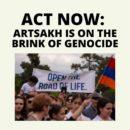Aysel Tuğluk, formerly a human rights activist, is a Member of Parliament for the province of Van in Turkey from the pro-Kurdish Peoples’ Democratic Party (HDP). Along with the two co-leaders of the party and 11 other fellow deputies, she was arrested and has been kept in jail without any trial since Dec. 2016, based on charges of “supporting a terrorist organization.”
Tuğluk’s 78-year-old mother, Hatun Tuğluk, of Alevi descent and originally from Dersim, passed away this week. As per her will, she was to be buried in an Ankara cemetery. With special permission of the jail authorities, Tuğluk was temporarily released from jail to attend her mother’s funeral and burial.
Just as her mother’s coffin was buried in the cemetery, a group of 30 fanatical ultranationalists showed up at the grave site with a tractor, chanting slogans such as “These are Turkish lands, these are not Armenian lands,” “Burial of Alevis, Armenians, and Kurds is not allowed here,” “Seeds of Armenian not allowed in a Turkish cemetery,” and more ominously, “If you don’t remove this coffin, we will shred it to pieces.”
Soon the mob increased to 100 people, and they started throwing stones at the mourners, including Tuğluk. Although many police officers were present, they simply watched the mob without interfering. In fact, several attackers seemed to know the officers and addressed them by name.
In the end, Tuğluk had no choice but to remove her mother’s coffin from the grave and decided to have her transported to Dersim for burial there. The prison authorities refused to allow Aysel to travel to Dersim, as the funeral permission was only for Ankara. So, while Aysel’s mother’s body traveled to Dersim, Aysel went back into jail.
The level of intolerance and hatred displayed during this incident is shocking. It is a generally accepted fact that any living person defined as “other”—that is, non-Turk, non-Sunni Muslim—will be subject to discrimination, insults, and even physical attacks in Turkey, but this incident showed that the scope of attacks now includes dead people.
There is no question that the attack was organized and planned, with the mob arriving just in time equipped with a tractor and prepared slogans, and obviously condoned by the state or deep state. The governor of Ankara minimized the incident as a provocation by a few drunken people, and the pro-government media covered the incident merely as “tension during a burial.”
In 1915, the main “others” were the Armenians, who were almost wiped out through genocide, resulting in a huge transfer of wealth, lands, and property to the government, as well as through government-sanctioned plunderers and attackers.
In 1955, again on a September night, it was the turn of the Greek “others.” Ultranationalist mobs attacked the houses, shops, and churches of the Greek minority in Istanbul, as revenge for the alleged bombing of Kemal Ataturk’s house-museum in Thessaloniki, Greece. All 73 Greek churches in Istanbul were burned, more than 5,000 properties were demolished, hundreds of Greeks were murdered, several hundred Greek women were raped, and two Greek priests were forcibly circumcised. Greek cemeteries were also attacked and newly buried bodies removed in search of gold teeth.
Years later, it was revealed that it was Turkish government intelligence forces themselves who planted the bomb at Kemal Ataturk’s house, organized and transported the attacking mobs in trucks, as well as supplied them with wooden clubs, all one standard size. Most of the Greek “others” left Turkey after that incident.
So now, the main “others” left in Turkey are the Kurds and the Alevis. However, 100 years of brainwashing preached in schools and mosques still keeps the hatred alive against the Armenians. Today, attacks or insults against Kurds and Alevis must also include the swear word “Armenian.” When government forces fought against the Kurdish militants in Diyarbakir for the past two years, they wrote on the walls of bombed out buildings or taunted the Kurds with loudspeakers, calling them “Armenian bastards, seeds of Armenians.”
Perhaps Hatun Tuğluk from Dersim did have Armenian roots, perhaps not. But that is not the issue for the ultranationalists, as long as they can direct their hatred of the Armenian toward all the remaining “others.”
For a few years, until about two years ago, the Turkish government preached respect for democracy and human rights, tolerance, and equality for minorities and all “others,” especially promoting peace and ending the war with the Kurds. The slogan “Turkey for Turks” was almost replaced with “Turkey for all citizens” for a few short years. Now, however, Turkey’s defining slogan seems to have become “Turkey only for Turks… who support President Erdogan.”





